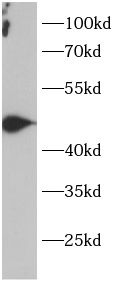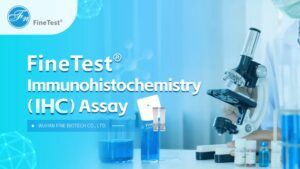Products
PTP1B antibody
Category:
- SPECIFICATIONS
- Product Name
- PTP1B antibody
- Catalogue No.
- FNab10253
- Size
- 100μg
- Form
- liquid
- Purification
- Immunogen affinity purified
- Purity
- ≥95% as determined by SDS-PAGE
- Clonality
- polyclonal
- Isotype
- IgG
- Storage
- PBS with 0.02% sodium azide and 50% glycerol pH 7.3, -20℃ for 12 months (Avoid repeated freeze / thaw cycles.)
Immunogen
- Immunogen
- protein tyrosine phosphatase, non-receptor type 1
- Alternative Names
- PTP 1B antibody, PTP1B antibody, PTPN1 antibody
- UniProt ID
- P18031
- Observed MW
- 50 kDa
Application
- Tested Applications
- ELISA, WB, IHC
- Recommended dilution
- WB: 1:500 - 1:2000; IHC: 1:50 - 1:200
Validated Images
 jurkat cells were subjected to SDS PAGE followed by western blot with FNab10253(PTP1B antibody) at dilution of 1:1000
jurkat cells were subjected to SDS PAGE followed by western blot with FNab10253(PTP1B antibody) at dilution of 1:1000
 Immunohistochemistry of paraffin-embedded rat kidney using FNab10253(PTP1B antibody) at dilution of 1:50
Immunohistochemistry of paraffin-embedded rat kidney using FNab10253(PTP1B antibody) at dilution of 1:50
- Background
- The protein encoded by this gene is the founding member of the protein tyrosine phosphatase (PTP) family, which was isolated and identified based on its enzymatic activity and amino acid sequence. PTPs catalyze the hydrolysis of the phosphate monoesters specifically on tyrosine residues. Members of the PTP family share a highly conserved catalytic motif, which is essential for the catalytic activity. PTPs are known to be signaling molecules that regulate a variety of cellular processes including cell growth, differentiation, mitotic cycle, and oncogenic transformation. This PTP has been shown to act as a negative regulator of insulin signaling by dephosphorylating the phosphotryosine residues of insulin receptor kinase. This PTP was also reported to dephosphorylate epidermal growth factor receptor kinase, as well as JAK2 and TYK2 kinases, which implicated the role of this PTP in cell growth control, and cell response to interferon stimulation. Two transcript variants encoding different isoforms have been found for this gene.



